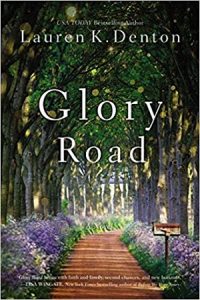Alabama-native Lauren K. Denton is the author of USA Today-bestselling novels The Hideaway and Hurricane Season. Her latest novel, Glory Road (Thomas Nelson), tells the story of three generations of women navigating the uncertain pathways of their hearts during a summer that promises to bring change—whether they’re ready for it or not. In this interview, Lauren introduces us to the main characters, reveals the spiritual themes in the book, and shares how her faith impacts her writing.
Lauren, Glory Road tells the story of three generations of strong Southern women, each on their own personal journey. Tell us about them…
On one end of the generational spectrum, we have Evan McBride. Evan is fourteen and feels out of step with other teens in her small hometown of Perry in south Alabama. Where most girls skinny jeans and country music popstars, Evan is more Bob Dylan and Converse sneakers.
feels out of step with other teens in her small hometown of Perry in south Alabama. Where most girls skinny jeans and country music popstars, Evan is more Bob Dylan and Converse sneakers.
She generally wants the people she loves the most—mom Jessie and grandmother Gus—to be happy, and she’s acutely aware of even the smallest cracks in their day-to-day consistency. Over the course of this one summer, she begins to see her mother as a woman who may be lonely in a way Evan never understood; her grandmother as someone who just may not be as steady as she once thought; and herself as capable of stretching her heart in ways she didn’t think possible.
On the other end of the spectrum, we have grandmother Gus McBride. Gus is a rhinestone-wearing widow who has a thing for peach cobbler and Johnny Cash. With her husband long gone and no other eligible men around except Harvis Rainwater up the road who drives a truck that stinks to high heaven, the last thing Gus expects is for love to come into her life.
And it just so happens to begin to bloom just as her mind starts acting up more than usual. She knows previous generations of women in her family have succumbed to Alzheimer’s but she’s going to do her darndest to not follow in their footsteps.
Smack in the middle of these two women is Jessie McBride. After divorcing her cheating husband ten years ago and moving back to the red dirt road where she grew up, Jessie is content in her role as daughter, mother, and community garden shop owner. Thinking she’s used up her shot at love, she’s surprised when two men—her old friend Ben and a handsome, older man, Sumner—walk into her life, each filling something inside her that’s been missing.
As she navigates the new teen years with Evan, her mother’s ailing (and yet still robust) health, and her own almost unrecognizable love life, Jessie finds life on Glory Road changing in ways none of them expected.
What inspired the different threads in this novel?
Over the years, I’ve discovered that I love writing about women of different ages. I enjoy contrasting younger women’s hope and aspirations with older women’s wisdom and freedom of speech. I had in mind a feisty older woman and before I even started writing the book, I knew her name was going to be Gus.
And I wanted a garden shop to play into the story. I’m sorry to admit that I’m not much of a gardener, but I love the metaphors between gardening and life, and I knew that’d be fun to work into the story.
The main inspiration for the story came from the road itself. My maternal grandparents lived on a red dirt road in a small town just outside Mobile, Alabama, where I grew up. As a child, I loved spending long afternoons at their house, and I loved how the dirt road made the place feel separated from the real world.
When I was thinking about settings for these three women I wanted to write about, I knew I wanted them to enjoy that same peace and quiet of a dirt road.
What spiritual themes or ideas play out in this book?
There’s a lot in the book about healing from the past and moving into the future with hope. I think all three women have trouble accepting good things that come their way, and over the course of the book, they learn to open their arms to the good things that come and accept them as the gifts they are. In this way, hints of redemption poke their heads in, even if it takes the characters themselves a while to understand this.
How does your faith impact the way you approach writing fiction?
I like to say I write “safe” books. I don’t shy from writing about things that cause hurt and conflict, but I do it in a way that makes my books safe for readers to hand to their mothers, grandmothers, and daughters.
One reason for that is I know my own daughters will be reading my books one day (in fact, my nine-year-old has listened to the audio version of Hurricane Season so many times, she can quote lines back to me!).
For me, being a Christian and a writer means there are some situations I just can’t put on the page, and I never want to condone something in a book that goes against something I believe in or that I caution my girls against. And while I don’t tie everything up at the end in a pretty package, I do want readers to close my book at the end and feel a sense of hope, encouragement, and redemptive closure.
What do you consider the best ways for readers to support their favorite authors?
If you read a book you love, tell your friends! Word-of-mouth is the best way for new readers to find books. And the second way is to write a review online. It seems like such a small thing, but reviews really do matter. They don’t have to be long or detailed. Even just an “I liked it!” helps. Authors often feel super awkward promoting our own books and asking people to read our books. Anytime a reader can help spread the word by telling a friend or leaving an online review, it supports an author in more ways you can imagine.
Visit Lauren K. Denton’s author page:
https://www.familyfiction.com/authors/lauren-k-denton
Glory Road
Lauren K. Denton
Thomas Nelson


